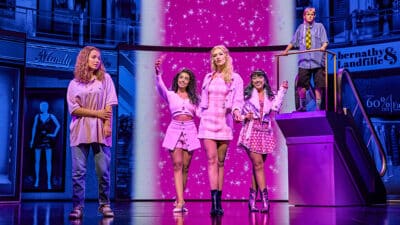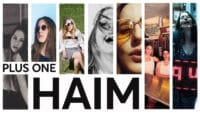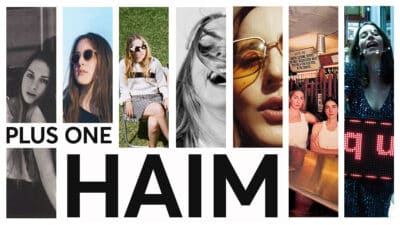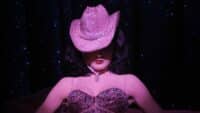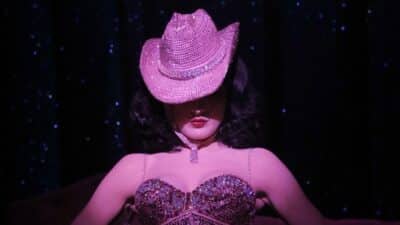Interview
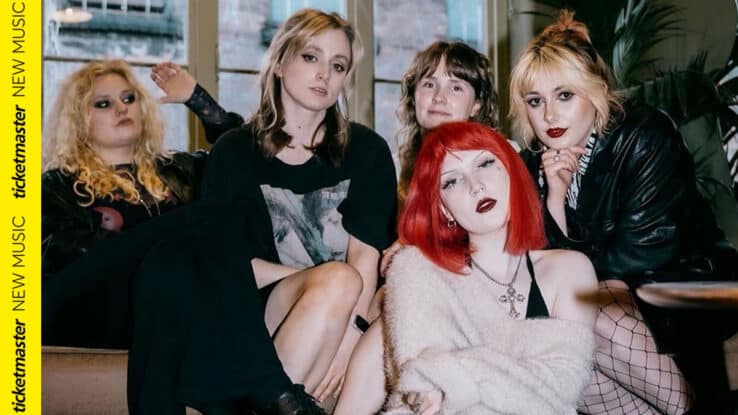
Interview
VENUS GRRRLS: “Women in these spaces have always existed”
VENUS GRRRLS talk the power of making music with your best friends, and how they're pushing for a more inclusive alternative scene
Taking on the UK alt-rock scene with a goth-grunge bite and a drive for change, Leeds/Newcastle-based quintet VENUS GRRRLS are a band with a firm mission statement.
A coven of five women inspired by the community-centred ethics of the riot grrrl movement, having grown up feeling like unwelcome intruders in the male-dominated rock world – VENUS GRRRLS are fighting for change. Penning songs about mental health, sexual abuse, personal transformations and more, since their 2021 debut EP Potions, they’ve been carving out their own unique space in the scene.
Leading the way for more non-men in music with a slew of recent singles – including brilliantly commanding latest release ‘Bloodsick’ – their collision of cascading riffs and synth motifs is truly one of a kind. Guided by the candid songwriting of powerhouse vocalist Grace Kelly (more commonly known as GK), this Northern bunch are putting a contemporary twist on the sounds that defined their adolescence.
Playing Reading & Leeds Festival this summer before embarking on their debut UK headline tour in September – where there’ll be partnering with stem cell charity Anthony Nolan on all dates – the remainder of 2024 is set to be a momentous one for VENUS GRRRLS. As they continue their ascension to the top of the rock scene, we caught up with the band to learn more about their vision.
Your sound fills in the gaps between ‘80s goth and ‘90s grunge. What inspired you to combine those two eras and funnel them into a contemporary context?
Grace Kelly [vocals/guitar]: It happened very organically. When we formed, we wanted to be a riot grrrl band, and we’ll always be a riot grrrl band at heart. Sonically though, it’s gone in a different direction. Such a huge part of what we do is pushed by Grace [Stubbings, synth], and she’s inspired the whole ‘80s vibe. We’ve got a lot of grunge and alternative roots in the band too, so we started thinking about how we could weave them together. Synth is so prominent in our songs, and we’ve tried to use that to separate us from other guitar music.
Hannah Barraclough [bass]: It’s predominantly a mix of the music that we listen to, which is a lot of grunge, and a lot of goth. Naturally, when you’re listening to that, you draw the influences from it. Grunge was a genre I was heavily brought up on, and I’ve always wanted to play in a grunge style. We’re leaning further into that territory as we evolve.
Your songs often draw on your personal experiences and traumas, delving into everything from mental health to sexual assault. Is it important that your songs come from an honest, candid space?
GK: As the lyricist, leaning into a fictional realm isn’t something I’m inherently opposed to. So far though, it’s been very autobiographical. If it’s not taken from my own life, it’s from shared experiences within the band. It comes from a place of wanting to use our platform and our voice to raise the alarm about things that we’ve experienced. The topics are often very hard-hitting and in-your-face, but the people who go through those things have to endure them whether they like it or not. When people tell us that our songs are intense it’s like, ‘Yeah, obviously?’
I’ve always liked to write autobiographically because oftentimes when someone is going through something like that, they can feel like they don’t have a voice. We’re very fortunate to have a platform, and I feel a great deal of responsibility to use it to amplify those voices.
Being able to have those conversations must strengthen your internal bonds too, and it feels as though you have an incredibly special relationship with one another. How much of an difference does it make to go into this industry with people you can trust and confide in?
Grace Stubbings [synth]: It’s so important, especially in the creative industries. Often you don’t have security, and you never know who you’re going to be working with when you collaborate with producers and record labels. The industry is so up and down, so it’s important to have a base of people that you can rely on. You’re promised a lot of things, and often those promises don’t come to fruition. You need that solid foundation, especially on a friendship level. You spend a lot of time with one another, and you need to have open communication and trust with the people that you’re working with. You need to be comfortable.
GK: You hear stories of bands falling out over petty things like writing credits, and I just couldn’t imagine that. I couldn’t be in a band where I didn’t trust my bandmates, or I couldn’t confide in them. Hats off to people who manage that, but it’s not for me.
You’ve released two singles so far this year, ‘Divine’ and ‘Bloodsick’, which both have a huge, driving distorted rock sound. Where have you been finding inspiration recently?
GK: When the band started to grow and develop, we decided that if we were going to do this, we wanted to do it in a different way. This band doesn’t make hugely experimental artsy music, and we love a hook, but we want to do something a little bit different from what our peers are doing. We all come from different musical backgrounds, which at first were quite difficult to mash together. It’s about marrying our unique genre backgrounds and finding the overlaps, because they do exist. For me, Heart are a huge influence, especially in terms of the vocals and the top lines. A lot of our dream-pop and synth-pop influence comes from Grace, the grunge comes from Hannah, and Eliza [Lee, guitar] loves the classic rock sound. All these genres are intertwined, and it’s about putting them together in a way that’s different. That’s how we constructed the new songs, but we’re also trying hard to make it even hookier. We’re trying to play with these sounds in a contemporary way, pulling bits from each of them and making it more radio friendly.
Hannah: Basically, we want to be ABBA mixed with Nirvana, with a sprinkle of Siouxsie Sioux on top.
The alternative music scene has historically been a male dominated space, but recently we’ve seen a lot more female and non-binary musicians find their space in the industry. Growing up, did you find that you had much representation to look up to?
Hannah: I was brought up on a lot of grunge, but also indie bands like The Killers and Arctic Monkeys. That scene was severely male dominated. I have wanted to play guitar since I was little, and I first picked it up when I was eight years old. When my schoolmates found out, I got the classic, ‘You’re good for a girl’. When I went to music college, there were 50 people on my course, and only five of us were women. There was so little representation. When I went to uni, I met my bandmates, and now these guys are my inspiration.
GK: Women in these spaces have always existed, but the platform hasn’t existed for them. People think that suddenly there are loads of women in bands, but they’ve always been there. Like Hannah, most of the music I discovered in my formative years was incredibly male dominated, but as a vocalist, I was infatuated with big ballads. I loved Whitney Houston, Leona Lewis, and Christina Aguilera, and I was obsessed with those kinds of singers when I was little. As I came into my teenage years, I discovered Fleetwood Mac, and everything changed. I fell in love with artists like Stevie Nicks and Debbie Harry, but even then, they were singers. People still have this idea that girls don’t play instruments, they just sit there looking pretty and singing.
Grace: With the likes of Björk, Kate Bush, and Grimes too, a lot of the time people just see them as singers, but they’re multi-instrumentalists, producers, and engineers. To this day, when you talk to anyone outside of the music industry about being in a band, they just presume you must be a singer.
Are you hoping that VENUS GRRRLS can encourage other non-men to pick up instruments and form bands?
GK: Absolutely. Sometimes our younger fans say stuff like, ‘I wish I was in a band’ and we’re always like, ‘Make one!’
Grace: It happens with the older fans too. In London we were chatting to some women who were older than us and they said, ‘Oh, we’re too old to be in a band now’. We were like, ‘No, just do it!’ Music is available to anyone, and it doesn’t matter what type of music you make, it’s still music. It’s a chance to come together.
GK: We want to contribute towards raising people of all genders onto that platform. We want them to know that they can be creative in any way that feels good for them.
Grace: It’s about confidence, isn’t it? When you get older and you’re given a platform like we have, your confidence as an individual grows. When you’re able to speak up, and you feel confident enough to, you should do it.
You’ve recently announced your first-ever headline tour, which you’ll be partnering with cell transplant charity Anthony Nolan for. Why is that cause so close to your hearts?
GK: In 2022, I was diagnosed with acute myeloid leukaemia, which is a cancer of the bone marrow. Oftentimes, people who have leukaemia – or other blood cancers such as lymphoma, and blood disorders such as sickle cell – need a stem cell transplant to survive. Fortunately, I managed to have chemo and haven’t yet needed a stem cell transplant. I’m completely healthy and in remission, but I have seen the life-saving power of a stem cell transplant for other people with AML. It’s something that I feel very passionate about, and the girls have waited on the sidelines for me to get through the cancer – which I’m so grateful for.
Hannah: Seeing your friend go through something like that is hard, but GK’s experience emphasised the importance of a charity like this. It’s an honour to take them out on tour with us and to spread the work that they do.
GK: People don’t realise how easy it is to join a stem cell register. You probably won’t ever have to do anything, but by signing up it means that you’re there just in case you’re a match for someone who needs a donor. I didn’t even know about it before I got ill, but as a band we feel a great responsibility to amplify various voices within the community. We feel a responsibility to share knowledge with people, and this is a very important cause to us.
Is it important to you that the things you do as a band always have a real-world impact, rather than just simply playing music?
Hannah: Art is inherently political in many ways, and there’s always going to be that undertone to what we’re doing. It’s not the only driving force for us though, and ultimately, we do it because we love music, and we love being on stage together. We’re just five goofy girls having fun, but it’s about balance. We have a passion for music, and we love writing together, but if there’s a chance that our experience can help someone else – we’re taking that chance.
GK: It’s cathartic when you touch on those subjects onstage too, and being able to connect with people over the tougher parts of life is something that I’m proud to be championing.
The goal for most artists is to create music as a full-time venture, but getting there is often filled with obstacles and setbacks. What is it that keeps you pushing towards that goal?
Hannah: The thought of soundtracking any person’s life is everything to us. When you’re young and first discovering your music taste, you often have one band that means the world to you. That band is a reminder of a whole section of your life, the good parts and the bad parts, and it’s nostalgic. The thought of being that band for someone is incredibly special, because we know how much those bands mean to us.
GK: As we get older, it’s becoming tougher to balance because bands often don’t even make a living wage. Sometimes I ponder the sustainability of it, but then I tune into my inner child and remember what gigs meant to me as a teenager. It’s so powerful to be able to bring people together in a room. When I catch Hannah doing something silly onstage and we start laughing together, that’s what it’s all about. Sometimes I have to ignore the fact that there are 1,000 people in front of me and focus on playing music with my best friends.
VENUS GRRRLS play Reading & Leeds festival in August, before starting their own UK tour in September. Find Venus GRRRLS tickets here





